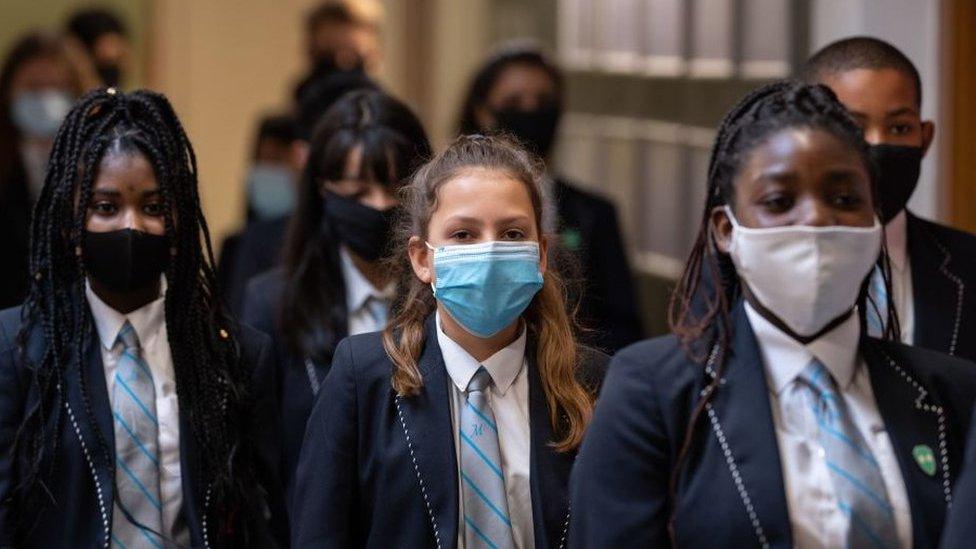Covid in Wales: Moves to 'minimise' pupils self-isolating
- Published
- comments
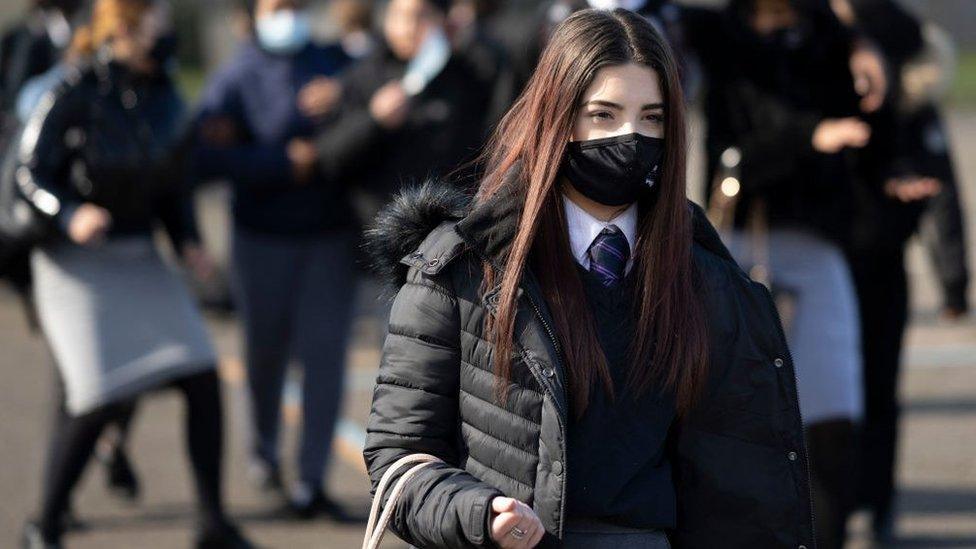
Face masks are currently required to be used in Wales' secondary schools where social distancing cannot be maintained
Wales' education minister says he wants to minimise the number of children having to self-isolate from schools.
Jeremy Miles told a press conference he wanted to make sure a "disproportionate" number of pupils were not having to self-isolate.
Councils in north-east Wales have told BBC Wales thousands of children are staying away from classes.
But a head teachers' union said it was "utterly confused" by Mr Miles' comments.
Mr Miles also said it would be up to individual schools, colleges and universities to decide their own Covid-safety rules in future - such as on social distancing, face masks and testing.
It does not mean the safety measures - which are currently subject to national guidance - will be totally scrapped.
But the minister said he wanted them to "gradually ease", with schools running as normal as possible in the autumn.
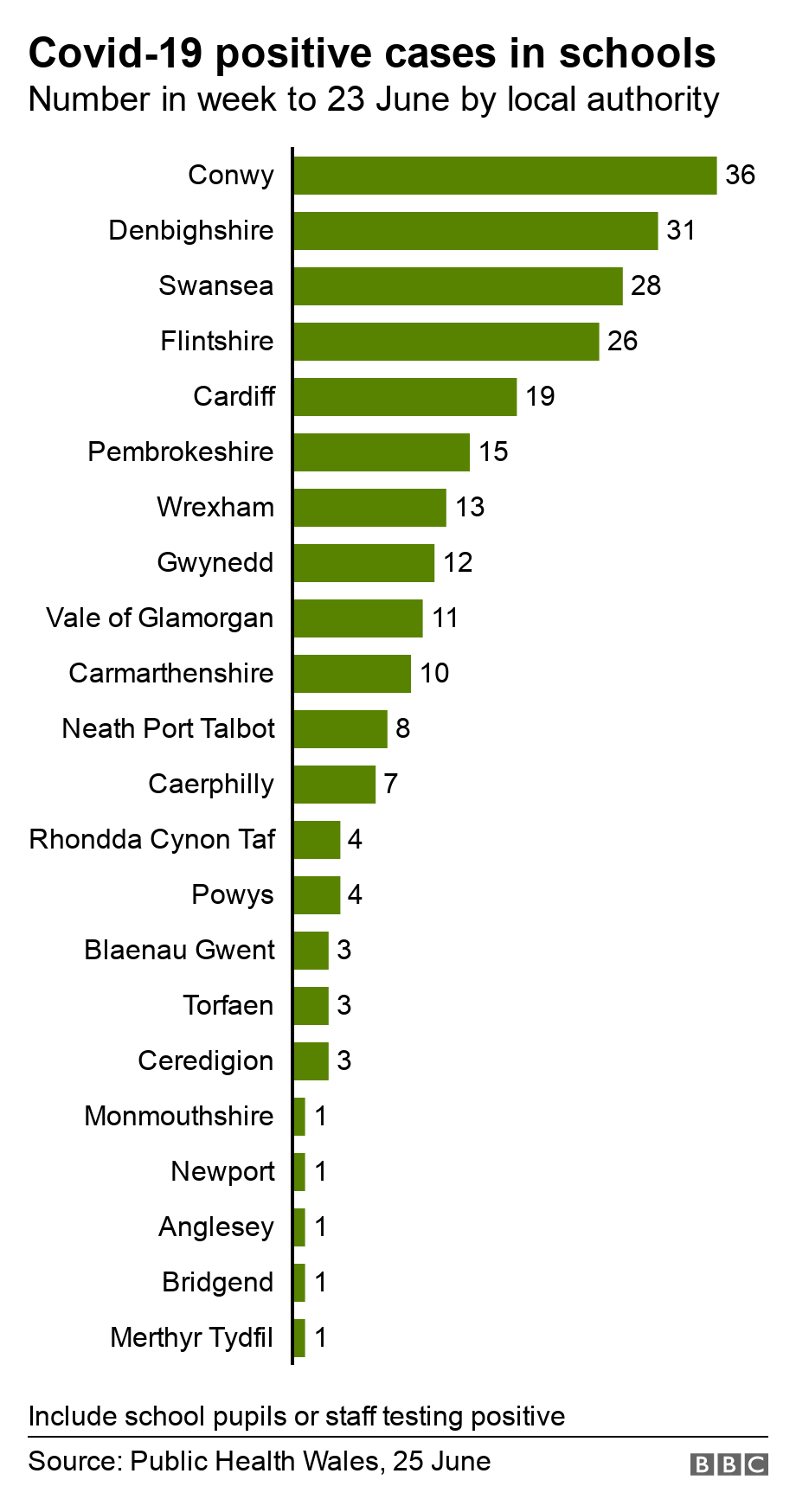

The latest three-day rolling number of cases across schools in north Wales is at an average of 26 new cases a day - higher than at the peak of the second Covid wave in December.
It compares with just eight cases a day in the Swansea Bay health board area, and less than one case a day on average across Powys.
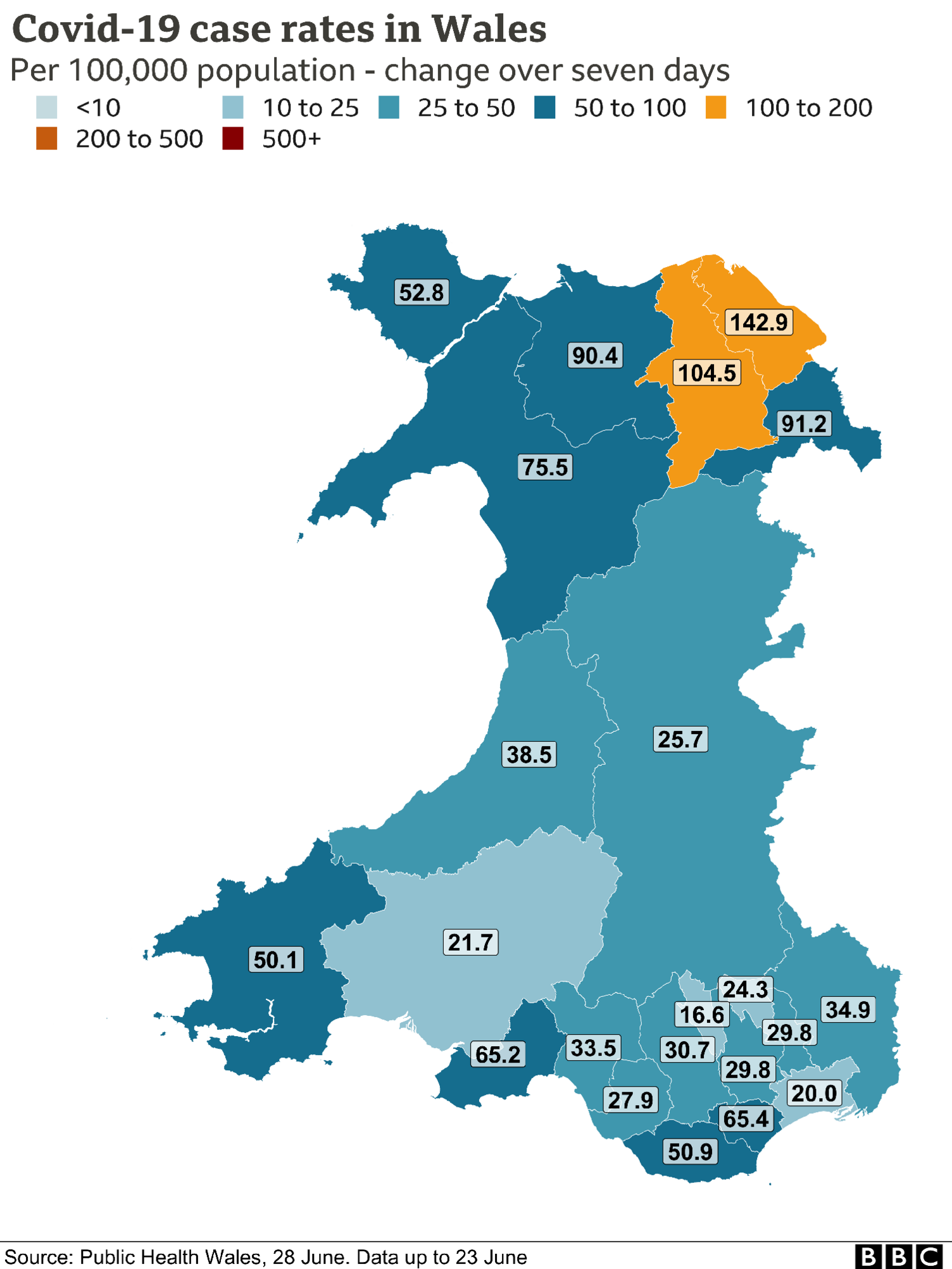

Groups of children, called bubbles, have been told to isolate when cases have been identified in their schools. That can involve entire year groups having to stay home.
Mr Miles said the Welsh government would be looking at "best practice across Wales to ensure that there we do not have a disproportionate number of learners self-isolating".
"While class or year bubbles have played an important role over the last year, we need to ensure that settings distinguish between bubbles on the one hand, and personal contact with cases on the other," he said.
Mr Miles said he wanted to make sure schools were not treating the individual contacts of a positive Covid-19 case and entire school bubbles the same way, "because they are importantly very separate".
He said schools would be helped to minimise the numbers having to self-isolate, using contact tracing.
Mr Miles acknowledged that in parts of north Wales cases were "increasing" - but he said it was not "inevitable" that more coronavirus cases would have an impact on schools there in the final three weeks of term.
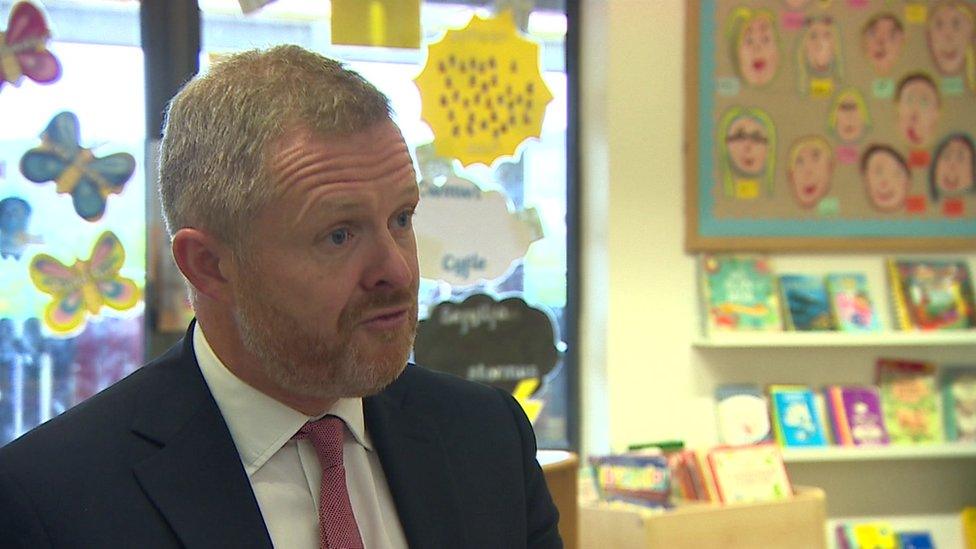
Jeremy Miles was appointed education minister in the Welsh government cabinet reshuffle
"While we will not simply be back to normal by September, we will look to gradually ease the extraordinary measures we've had to put in place," Mr Miles told the press conference.
"Our guiding principle has to be a move towards education being enabled to operate as normally as possible in the autumn.
"Currently, all education settings follow national guidance. However, as we move through the pandemic there will be a need to move to a more localised approach, rather than a blanket approach," he added.
Eithne Hughes, director of Association of School and College Leaders Cymru, said: "It appears from the education minister's statement that he suspects some schools in Wales are guilty of sending home large numbers of young people to self-isolate unnecessarily.
"The very last thing any school leader wants to do is to now have learners lose any more time in the classroom following the significant disruption to education they have experienced over the course of the last 16 months."
'Proposals could be hugely disruptive'
Laura Doel of the National Association of Head Teachers Cymru Laura Doel said: "Whilst we all went to see an end to restrictions on social distancing in schools as soon as possible, the plan to do away with 'class bubbles' but retain a requirement for schools to identify close contacts of pupils is impractical," she said.
She added: "The proposals, with all the unintended consequences, have the potential to be hugely disruptive.
"We are utterly confused by the minister's statement, which we think could actually increase the number of close contacts rather than reduce them."
Welsh Conservative education spokeswoman Laura Anne Jones said: "We can't afford for whole communities to be left behind thanks to a postcode lottery in education provision, and Labour ministers need to show leadership on this issue, and not pass the buck and responsibility for decision-making on to staff and schools that are already under enormous pressure."
Plaid Cymru's Sian Gwenllian it was "crucial that the government is absolutely transparent with the public and provides a full picture on how quickly the virus is spreading in our classrooms and what measures they are putting in place - such as increased ventilation and vaccinations for young people - to curb the spread."
'Unique experience'
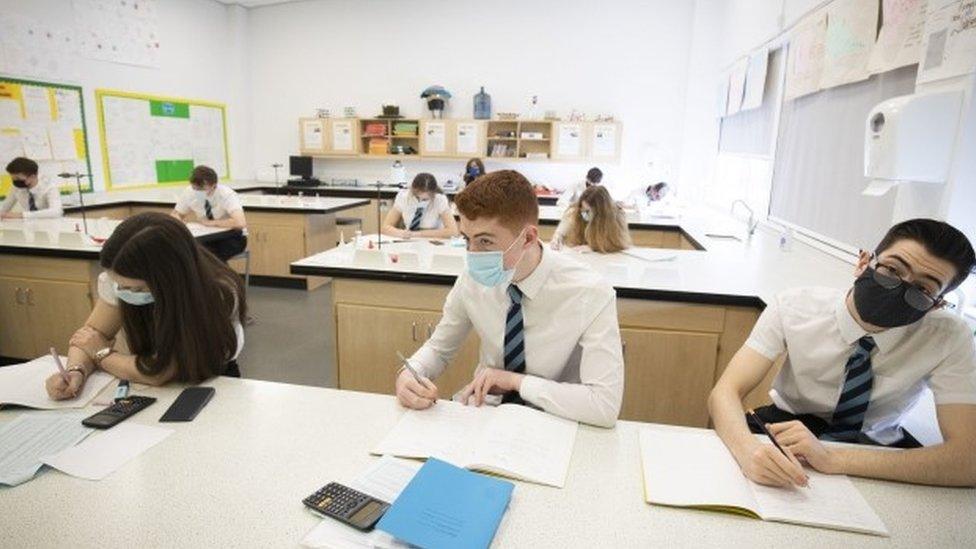
Keith Maher, head teacher of Pen y Dre High School, Merthyr Tydfil, said while he was looking forward to seeing an easing of restrictions he did not want to do anything that would "take us back a step".
Speaking before Mr Miles' press conference, he said schools had adapted well to the "unique experience" and he was "quietly satisfied" with the way it had gone.
Looking towards the autumn term, he said he wanted to see "opening up slowly, surely, gradually in a measured way to make sure our children don't miss out on the fun of being young".
"What we are looking for is clarity of information, a shared understanding of what the new term will look like but hopefully moving towards further easing back on risk assessments."
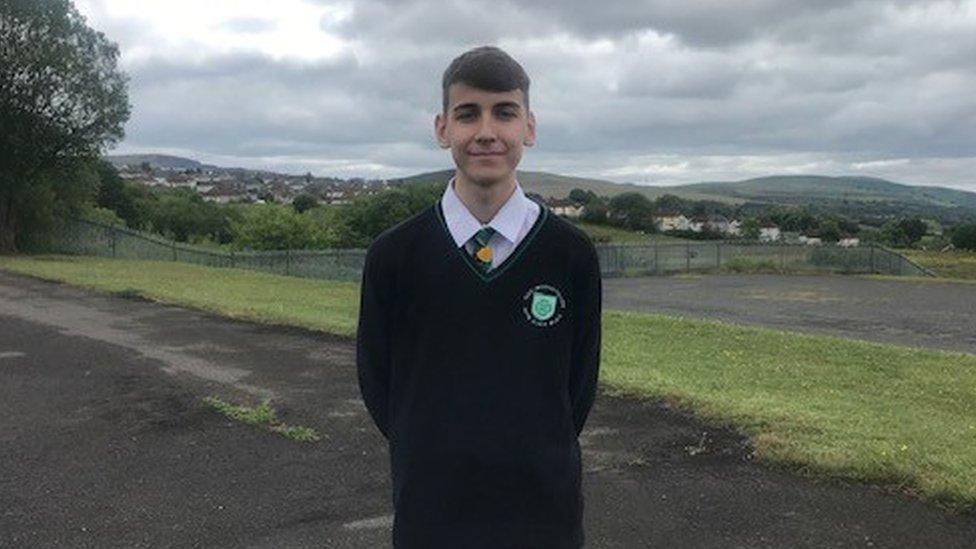
Sam says he is happy to have restrictions in place if it means he can stay in school
Sam, 15, is in Year 10 at Pen y Dre High School and said he did not mind Covid measures if it meant in-person teaching could take place.
"We are grateful because online learning wasn't quite one-to-one, but now teachers are making it better to get back to normality so any measure we need to take is fine with me."
He thought being able to go to school without face masks next term could boost morale but was happy for other measures to stay in place.
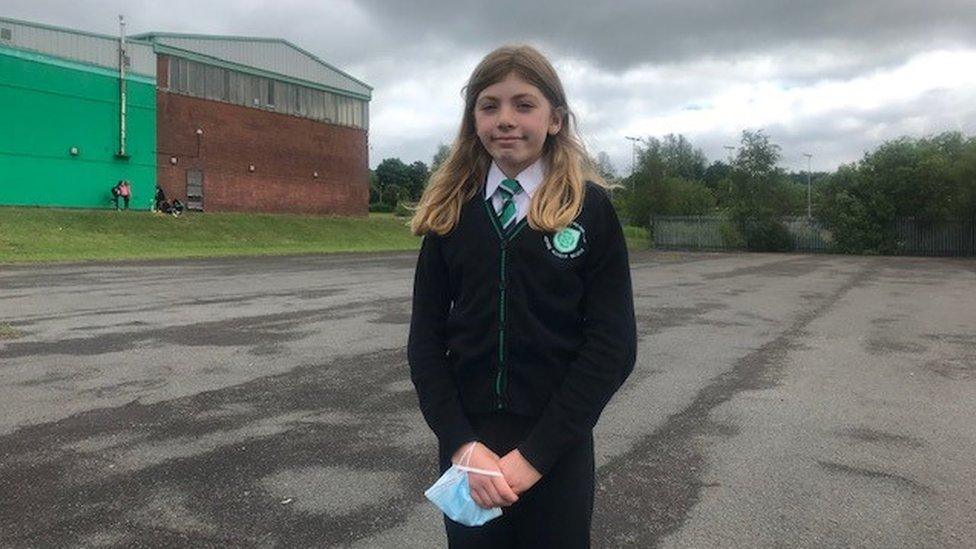
Gracie says she hopes she will not have to wear a mask in future
Gracie, 12, went up to Year 7 while restrictions were in place which were not required in primary schools.
She said she had got used to it - but some measures had made it harder to make friends and children missed out on more practical lessons such as drama.
"I really enjoy school at the moment but if it went down to 1m instead of 2m distance I could make more friends and be more comfortable," she said.
- Published21 June 2021

- Published28 May 2021
